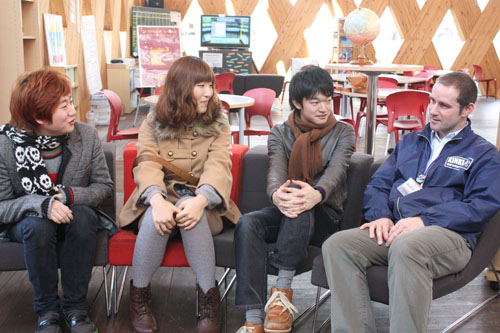This article is part 2 of 2 of the series ‘Programs for International Students in Japanese Universities’ of the CNU Press and Broadcasting Team sent to three Japanese universities last January 2012 for its Special Winter Coverage. – Ed.
Currently, Chonnam National University (CNU) houses more than a thousand foreign students, seen as a boom of the foreign student population not only at CNU but at different universities in South Korea as well. The anticipation however for them is still new to the university administration; therefore proper programs for foreign students are at risk of misevaluation. Gradual increase, full government support and mutual understanding played a huge role in building the foreign student population in Japan which has enabled the country to reap the benefits of its long-term investment. In what ways can CNU learn from the experience of Japanese universities?


Culture Is the Key
“Immersion programs for foreign students to Japanese youngsters strengthened my understanding of the Japanese culture, and my own culture to them,” says Park So-yon (Junior, Department of Political Science and Diplomacy), currently an exchange student at Osaka University. “The problem starts with the culture. I think that foreign students should learn about the culture first through different programs in order to adjust easily to the Japanese way of life,” she adds. In a nutshell, culture is definitely one of the key points that foreign students should understand with the guidance of the university administration. Of programs dedicated to the immersion of foreign students to the Japanese way of life, Osaka University has the host family program, the Brothers and Sisters Program, friendly exchange programs with local students and the tutoring program amongst others.
CNU clearly lacks programs that encourage cultural exchanges. Emiko Kanda, an exchange student from Osaka University to CNU last 2010, adds to the fact that CNU’s one and only cultural exchange program, the Buddy-Buddy Program (now changed into the Foreigner Assistance Program) was “not that helpful for me in adapting to life at CNU.” Marina Tognoli (Junior, Department of English Language and Literature) from Brazil sees that this problem can be rooted in the “improper matching of student pairs and lack of proper evaluation in the duration of the program itself.”
Towards Academic Excellence
“While foreign students at our university provide positive effects, there is a need to maintain high standards in the screening selection to secure continuous quality foreign students applications in the future,” says Toshiyuki Kado, coordinator of international students at Kinki University. Like Kinki University, most universities in Japan require its foreign students to take an examination as well as a full screening on their language abilities. Once in the university, foreign students are provided assistance by their buddies and are taken care of by their respective departments to maintain high academic performance of the students. “Even Japanese students who live in the dormitories try to group themselves and help-out foreign students who are struggling with the language!” adds Na Min-Ji (Junior, Department of Communication), CNU exchange student to Osaka University, while explaining the voluntary aid that local students give to their foreign counterparts.
Life in General as a Foreign Student in Japan
At present there is little support in programs for foreign students at CNU, most of them even initiated by other foreign students and are independent from CNU administration support in comparison to Japanese universities that have solid support programs for foreign students. Doshisha University in Kyoto, for one, has its own International Community Lounge, open for foreign and local students for anything that they need, different country-based student associations supported by Doshisha’s Office of International Affairs. Osaka University has its own Osaka University International Student Association, recognized by the administration that serves as the link of foreign students to the rest of the community on-campus.
“Not everyone is given the chance, but for those fortunate, stakes are high” says a Korean student studying at Doshisha University. We can see how prepared Japanese universities are in receiving foreign students into its gates, a strategy formulated with experience. On the other hand, CNU, with its growing number of foreign students relies on crisis intervention: facing the problems when it comes by. In the era that globalization is the norm, it is very important to take a step back and choose the right strategy based on the experience of others.
By Rigoberto Banta Jr., Student Editor
[Feature]
Rigoberto Banta Jr. 기자
tribune@cnumedia.com

